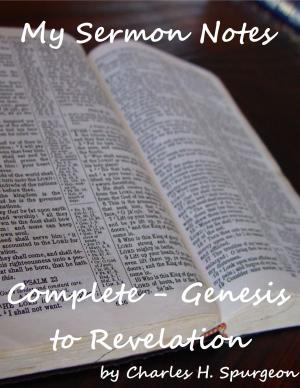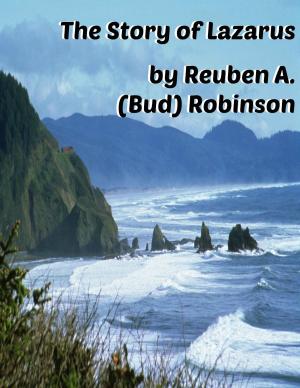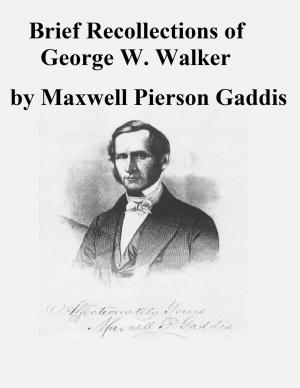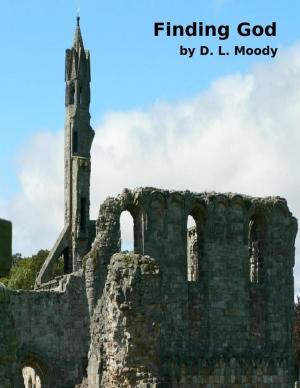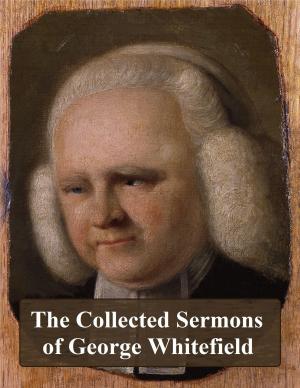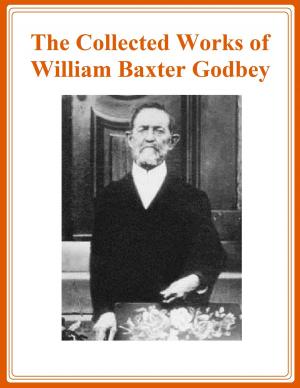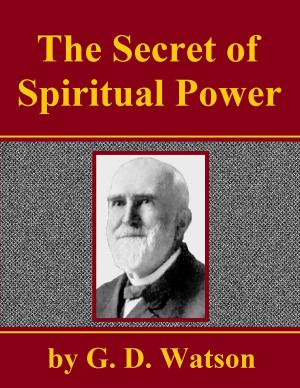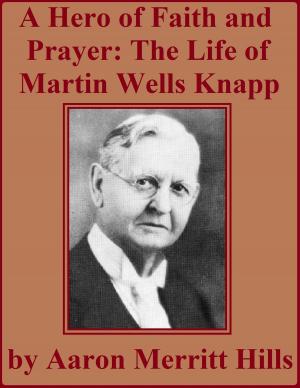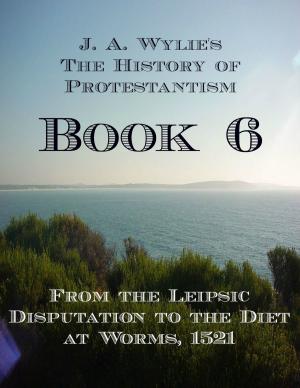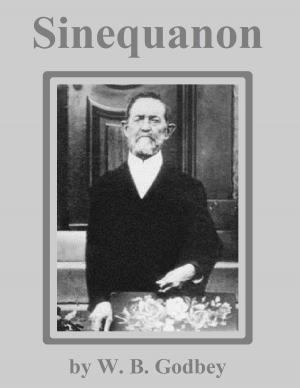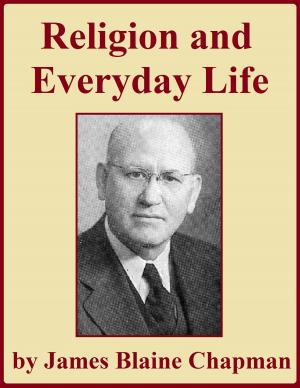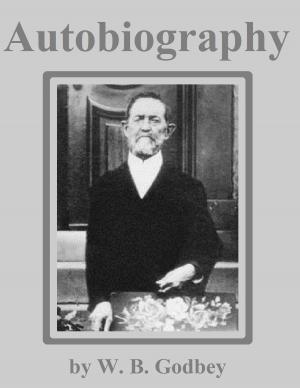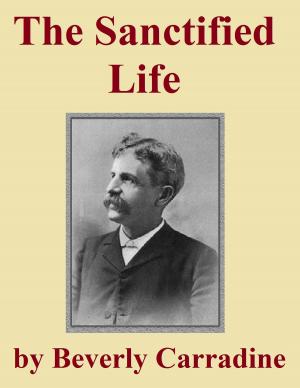Methodist Heroes of Other Days
Nonfiction, Religion & Spirituality, Christianity, Denominations, Methodism, Church, Church History, General Christianity| Author: | Samuel Gardiner Ayres | ISBN: | 1230000293184 |
| Publisher: | Jawbone Digital | Publication: | January 24, 2015 |
| Imprint: | Language: | English |
| Author: | Samuel Gardiner Ayres |
| ISBN: | 1230000293184 |
| Publisher: | Jawbone Digital |
| Publication: | January 24, 2015 |
| Imprint: | |
| Language: | English |
From the book's introduction:
The present generation of Methodists, it is feared, know few of the names of the Methodists of former days, and still less of the manners and speech of the olden time. Some have an idea that the preachers were uneducated, ignorant ranters, and that their hearers were emotional and easily impressed.
The preachers of the early days were sometimes ignorant men, but filled with the love of Christ and burning with zeal to extend his kingdom. Many were graduates of "Brush College," as they facetiously called the itinerant method of study. Their saddlebags contained their library, and whenever they could they studied. Whenever an older preacher was met the younger one would ask questions and receive instruction and advice.
The times were such that there was a greater opportunity for the development of individuality than now. So some eccentric men arose, such as Lorenzo Dow, whom some men refused to allow in the pulpit, not understanding him and having no patience with him. We must not lose sight of the fact that they were greater than their oddities, and that they were used as the instruments of God in winning many men to Jesus Christ. Today the stories of their eccentricities amuse us, and we are apt to forget that they were flaming evangels.
The ministers of the olden time were of the stuff of which heroes are made. They were in labors abundant, in journeys oft and far. They suffered from hunger and thirst, from perils from men and beasts, from poverty and toil. Yet they failed not nor faltered, but were faithful unto the end.
They secured great results, for above all else they were men of great faith. They took God into partnership, and he was often drawn upon, and always acknowledged the draft. Thus out of the trials was evolved sainthood, and out of their sanctification came glorification.
They were men who were great in prayer. They often trod the way into the Holy of holies. They were importunate in their faith. They expected to receive an answer, and so it came. Their training was such that they read human nature like an open book. It seemed at times as if they were inspired. Their messages brought hidden things to light, and made the greatest braggarts quake.
They were all things to all men, yet they never ceased to be manly, noble, and true. Their lives were a rebuke to other men because of their purity. Their fearlessness was a challenge to the powers of evil to do their worst. They were great defenders of the faith. They defended the truth against Calvinists, Arians, deists, and Universalists. Rarely were they beaten. They had to defend their flock from the proselytizer, the infidel, and rum, and they did it bravely and valiantly.
All hail to our Methodist preachers of olden days! From them we may derive lessons of wisdom and cheer. We are in the midst of a great conflict. They can teach us how to fight. We may have better equipment, a fairer field, and a more courteous opponent, but we can never surpass them in the splendor of their manly spirit and sacrifice.
* * * * *
The Table of Contents are as follows:
Chapter 1: FRANCIS ASBURY THE TRIUMPHANT
Chapter 2: PHILIP EMBURY, THE FIRST OF A NOBLE COMPANY
Chapter 3: WILLIAM McKENDREE, THE FIRST AMERICAN-BORN METHODIST BISHOP
Chapter 4: HENRY WILLIS, THE FIRST PRESIDING ELDER
Chapter 5: GEORGE PICKERING, NEW ENGLAND EVANGEL
Chapter 6: ANNING OWEN, THE APOSTLE OF THE WYOMING VALLEY
Chapter 7: PETER MASSIE, OF KENTUCKY
Chapter 8: THOMAS MORRELL, SOLDIER AND BISHOP'S COMPANION
Chapter 9: JESSE LEE, THE NEW ENGLAND PIONEER
Chapter 10: GEORGE DOUGHERTY, THE ONE-EYED HERO
Chapter 11: WILLIAM WINANS, THE INDEFATIGABLE
Chapter 12: ALFRED BRUNSON, THE SOLDIER PREACHER
Chapter 13: SHADRACH BOSTWICK, M.D., "PROFESSOR IN BRUSH COLLEGE"
Chapter 14: ZENAS CALDWELL – 1800-1826
Chapter 15: ROBERT BOYD, AN OHIO METHODIST PIONEER
Chapter 16: RICHMOND NOLLEY, MISSIONARY
Chapter 17: SAMUEL TUCKER, MARTYR TO DUTY
Chapter 18: GEORGE HARMON, TRAVELING COMPANION OF BISHOP McKENDREE
Chapter 19: JOHN CLARK, INDIAN MISSIONARY
Chapter 20: WILLIAM BEAUCHAMP, ALMOST A BISHOP
Chapter 21: PHILIP GATCH, PREACHER AND JUDGE
Chapter 22: VALENTINE COOK, ORATOR
Chapter 23: HOPE HULL, EDUCATOR
Chapter 24: JOHN GADDIS, THE HEROIC CONVERT
Chapter 25: WILLIAM B. CHRISTIE
Chapter 26: GLEZEN FILLMORE, THE FIRST METHODIST PASTOR OF BUFFALO, NEW YORK
Chapter 27: JAMES MOORE, OF NEW JERSEY
Chapter 28: JOHN KOBLER, THE YOUNG PRESIDING ELDER
Chapter 29: JOSEPH LILLARD, COLLEAGUE OF SAMUEL TUCKER
Chapter 30: JACOB GRUBER, THE ECCENTRIC
Chapter 31: JAMES GILMORE OF THE ECCENTRIC GROUP
Chapter 32: JOHN RAY, THE WITTY KENTUCKIAN
Chapter 33: "REFORMATION" JOHN ADAMS
Chapter 34: BILLY HIBBARD, THE ECCENTRIC
Chapter 35: JOHN HASLAM, TEMPERANCE REFORMER
Chapter 36: GEORGE GARY, THE YOUNG PRESIDING ELDER
From the book's introduction:
The present generation of Methodists, it is feared, know few of the names of the Methodists of former days, and still less of the manners and speech of the olden time. Some have an idea that the preachers were uneducated, ignorant ranters, and that their hearers were emotional and easily impressed.
The preachers of the early days were sometimes ignorant men, but filled with the love of Christ and burning with zeal to extend his kingdom. Many were graduates of "Brush College," as they facetiously called the itinerant method of study. Their saddlebags contained their library, and whenever they could they studied. Whenever an older preacher was met the younger one would ask questions and receive instruction and advice.
The times were such that there was a greater opportunity for the development of individuality than now. So some eccentric men arose, such as Lorenzo Dow, whom some men refused to allow in the pulpit, not understanding him and having no patience with him. We must not lose sight of the fact that they were greater than their oddities, and that they were used as the instruments of God in winning many men to Jesus Christ. Today the stories of their eccentricities amuse us, and we are apt to forget that they were flaming evangels.
The ministers of the olden time were of the stuff of which heroes are made. They were in labors abundant, in journeys oft and far. They suffered from hunger and thirst, from perils from men and beasts, from poverty and toil. Yet they failed not nor faltered, but were faithful unto the end.
They secured great results, for above all else they were men of great faith. They took God into partnership, and he was often drawn upon, and always acknowledged the draft. Thus out of the trials was evolved sainthood, and out of their sanctification came glorification.
They were men who were great in prayer. They often trod the way into the Holy of holies. They were importunate in their faith. They expected to receive an answer, and so it came. Their training was such that they read human nature like an open book. It seemed at times as if they were inspired. Their messages brought hidden things to light, and made the greatest braggarts quake.
They were all things to all men, yet they never ceased to be manly, noble, and true. Their lives were a rebuke to other men because of their purity. Their fearlessness was a challenge to the powers of evil to do their worst. They were great defenders of the faith. They defended the truth against Calvinists, Arians, deists, and Universalists. Rarely were they beaten. They had to defend their flock from the proselytizer, the infidel, and rum, and they did it bravely and valiantly.
All hail to our Methodist preachers of olden days! From them we may derive lessons of wisdom and cheer. We are in the midst of a great conflict. They can teach us how to fight. We may have better equipment, a fairer field, and a more courteous opponent, but we can never surpass them in the splendor of their manly spirit and sacrifice.
* * * * *
The Table of Contents are as follows:
Chapter 1: FRANCIS ASBURY THE TRIUMPHANT
Chapter 2: PHILIP EMBURY, THE FIRST OF A NOBLE COMPANY
Chapter 3: WILLIAM McKENDREE, THE FIRST AMERICAN-BORN METHODIST BISHOP
Chapter 4: HENRY WILLIS, THE FIRST PRESIDING ELDER
Chapter 5: GEORGE PICKERING, NEW ENGLAND EVANGEL
Chapter 6: ANNING OWEN, THE APOSTLE OF THE WYOMING VALLEY
Chapter 7: PETER MASSIE, OF KENTUCKY
Chapter 8: THOMAS MORRELL, SOLDIER AND BISHOP'S COMPANION
Chapter 9: JESSE LEE, THE NEW ENGLAND PIONEER
Chapter 10: GEORGE DOUGHERTY, THE ONE-EYED HERO
Chapter 11: WILLIAM WINANS, THE INDEFATIGABLE
Chapter 12: ALFRED BRUNSON, THE SOLDIER PREACHER
Chapter 13: SHADRACH BOSTWICK, M.D., "PROFESSOR IN BRUSH COLLEGE"
Chapter 14: ZENAS CALDWELL – 1800-1826
Chapter 15: ROBERT BOYD, AN OHIO METHODIST PIONEER
Chapter 16: RICHMOND NOLLEY, MISSIONARY
Chapter 17: SAMUEL TUCKER, MARTYR TO DUTY
Chapter 18: GEORGE HARMON, TRAVELING COMPANION OF BISHOP McKENDREE
Chapter 19: JOHN CLARK, INDIAN MISSIONARY
Chapter 20: WILLIAM BEAUCHAMP, ALMOST A BISHOP
Chapter 21: PHILIP GATCH, PREACHER AND JUDGE
Chapter 22: VALENTINE COOK, ORATOR
Chapter 23: HOPE HULL, EDUCATOR
Chapter 24: JOHN GADDIS, THE HEROIC CONVERT
Chapter 25: WILLIAM B. CHRISTIE
Chapter 26: GLEZEN FILLMORE, THE FIRST METHODIST PASTOR OF BUFFALO, NEW YORK
Chapter 27: JAMES MOORE, OF NEW JERSEY
Chapter 28: JOHN KOBLER, THE YOUNG PRESIDING ELDER
Chapter 29: JOSEPH LILLARD, COLLEAGUE OF SAMUEL TUCKER
Chapter 30: JACOB GRUBER, THE ECCENTRIC
Chapter 31: JAMES GILMORE OF THE ECCENTRIC GROUP
Chapter 32: JOHN RAY, THE WITTY KENTUCKIAN
Chapter 33: "REFORMATION" JOHN ADAMS
Chapter 34: BILLY HIBBARD, THE ECCENTRIC
Chapter 35: JOHN HASLAM, TEMPERANCE REFORMER
Chapter 36: GEORGE GARY, THE YOUNG PRESIDING ELDER

